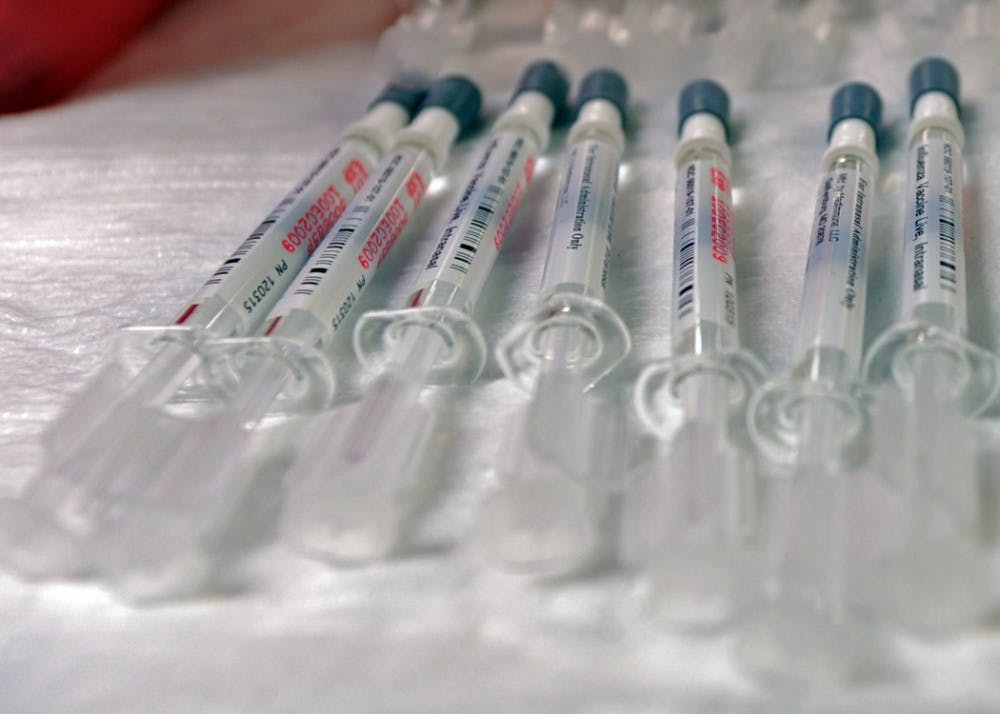With flu season almost upon us, one of the best forms of defense is to learn how to recognize and prevent the flu. According to the Centers for Disease Control and Prevention (CDC), symptoms of the flu typically include fever, cough, sore throat, runny or stuffy nose, body aches, headaches, fatigue and in some cases vomiting and diarrhea.
It is easy to confuse these symptoms with those of the common cold because both diseases are so similar.
In general, the symptom onset of the flu is more abrupt than that of the common cold, and it is commonly accompanied by fever and headaches. It is more likely for people affected by the common cold to have a stuffy or runny nose rather than a fever or headache.
The flu is spread when the tiny droplets made when a person infected with the flu coughs, sneezes or talks contact another person’s nose or mouth. On occasion, one might also become infected after touching an infected surface and then touching one’s mouth or nose.
Those affected by the influenza virus can infect others starting a day before they become symptomatic and up until about six days after developing symptoms. This is why hand washing is highly recommended during flu season, which typically extends from the beginning of October to March or even May.
Treatment of the flu for people with mild symptoms relies on rest, and those infected are recommended to limit contact with others to prevent the further spread of the disease.
In some cases, the flu may be treated by a healthcare provider with antiviral medication. These drugs have the ability to lessen the severity of flu symptoms and shorten illness time by one to two days. In addition, antiviral medications are recommended for groups who have a high risk of developing complications from the flu.
The most effective way to prevent being infected by the flu is to get a flu vaccine before flu season begins. Vaccination is recommended by the CDC since antibodies that protect against the influenza virus take about two weeks to develop. CDC studies have revealed that the flu vaccine reduces the risk of contracting the flu by between 40 to 60 percent.
While it may seem like the likelihood of contracting the flu is up to chance, Junior Vedika Karandikar, who is majoring in Public Health and Molecular and Cellular Biology, believes that the benefits of vaccination are substantial, especially since freshmen are more prone to sickness — a phenomenon Hopkins students call “Freshman Plague.”
“Getting vaccinated is very important, especially as a college student, because we are in an environment where we are constantly interacting with people. As such, it is much easier to get sick,” she said. “Think about the Freshman Plague for instance. By getting vaccinated, we are helping to not only keep ourselves healthy but also helping to make sure that those who may have weaker immune systems stay healthy too.”
It is highly recommended that everyone above the age of six months gets a flu vaccine every year because the influenza virus is constantly changing, so vaccines must change with it. Every year the composition of flu vaccines is modified in order to ensure optimal protection during that year’s flu season.
At Hopkins, the Student Health and Wellness Center will be hosting on-campus flu clinics throughout the semester. No appointment will be necessary to obtain the vaccine, students can just walk into the clinic at the specified date, time and location. The cost of the flu vaccine will be $20 for students with private insurance and free of cost for students with the school health benefit plan.
In addition, the flu vaccine will also be free for the first 75 students with private insurance that arrive at each clinic. Payment options at the on-campus flu clinics will include cash, check, J-Cash, credit card and Bursar billing. The flu clinics in September and October will take place as follows:
-Sept. 18 at Peabody Institute from 11 a.m. to 2 p.m.
-Sept. 25 at Charles Commons Barber Room from 4 p.m. to 7 p.m.
-Oct. 9 and 27 at Brody Learning Commons 4040 from 4 p.m. to 7 p.m.
More information regarding future on-campus flu clinics may be found on the Student Health and Wellness Center’s website.





